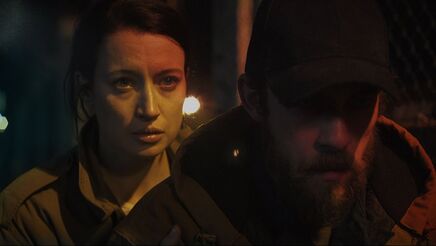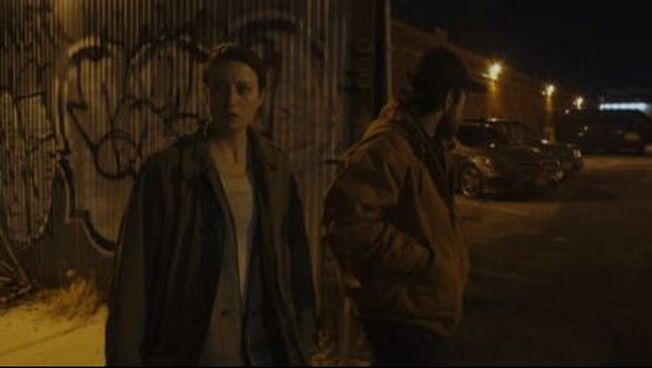[Fantasia 2021 Review] 'When I Consume You' is an Emotional Horror that Swallows the Viewer Whole8/24/2021  “Love is everything…” …Here’s the thing about love. It is everything. Anyone who has ever said they weren’t motivated by love is a liar. Or possibly a cold-blooded lizard person. Love pushes us to our limits. It makes us do things we normally wouldn’t do. It consumes us. Hence the title of writer/director Perry Blackshear’s (They Look Like People) new film, When I Consume You, which just premiered at the Fantasia Film Festival. But love is not all that consumes us. When I Consume You follows siblings Daphne (Libby Ewing) and Wilson (Blackshear regular Evan Dumouchel). A pair with a past in which they were abused, all they have now is each other. They protect one another. They keep each from spiraling back down self-destructive tendencies. Until a stranger murders Daphne, leaving Wilson alone and filled with rage towards her killer. Together with the ghost of Daphne, Wilson sets out to find the fiend, unsuspecting of the demons both external and internal which he is about to face. Goddamn, is When I Consume You a tearjerker. If you’ve seen Blackshear’s They Look Like People or The Siren, then you already know that his work is extremely minimalist and always focused more on human stories and the horror of the struggles that go on within us. He is a master of exploring our inner demons and finding the soul of the human experience. When I Consume You is no exception. Shot largely in our protagonists’ apartment and on the streets of the city, When I Consume You is an intimate expression of grief and rage that captures the audience with an absolutely devastating performance from Dumouchel. This may be his best work yet with Blackshear. Following an eerie opening in which Daphne is spitting blood and teeth into a sink, we’re introduced to the pair through old photos of them as kids—spliced together with images of a demonic painting to set up the horror to come—living by the train tracks in a place that may not be the Ritz, but somewhere which they can call their home. Daphne wants to adopt a kid, and Wilson wants to be a teacher. “It’s really scary to be a kid,” says Wilson. These are two people who have always been there for one another, and want to be there for kids who may not have someone as they did. Wilson, the endearing bastard, even has a setup of plants which he has labeled “the fellowship of the plants” and takes care of like his own children. Blackshear establishes a deep bond between the two that feels incredibly personal and real, which I can attest to as a child of divorce myself who became best friends with my sister during my parents split. Wilson is right when he says that it’s scary being a kid, because kids don’t always understand what’s going on or why, and so it’s entirely natural that Wilson and Daphne have become so close. As is the utter rage which Wilson feels once she is taken away, in a quiet, too-real and heartbreaking moment that reaches into your chest and squeezes your heart into jelly. Blackshear incorporates low-lighting which pairs well with the grainy look of the film to incorporate a grim and seedy atmosphere. Wilson’s apartment feels like purgatory, the city streets dark crossroads through hell. Mitch Bain emphasizes Wilson’s internal pain with a score that is piercing and somewhat unpleasant, but effective in gluing us into Wilson’s shoes, where he can hear nothing but the rage ringing in his ears. Aside from the opening scene and Daphne’s ghostly hand appearing out of nowhere like a J-horror nightmare, When I Consume You isn’t necessarily meant to frighten…at least not until towards the end. For a long while, the horror isn’t in Daphne’s killer, it’s in Wilson’s painful journey within himself. So don’t expect your typical demonic monster movie. When I Consume You is an arthouse horror flick which uses demons as a metaphor for our vices and how Daphne and Wilson’s own addictions consume them. Think of it like a slow unzipping and dumping out of Wilson’s pained guts than any kind of demon shoving a pitchfork into your butt-cheek to illicit a scream. Which isn’t to say that When I Consume You is without it’s unsettling terror. Blackshear does eventually inject this story with the supernatural and some intense (and bloody) moments that come as quite a shock after an hour of slow-building but quiet psychological torment. That’s part of what makes a Blackshear film so effective: The quiet. When I Consume You has a soft approach, as if it’s sitting right there next to you and holding your hand as it whispers in your ear, sometimes sweet, sometimes threatening. Even the killer themselves speaks in low whispers, Blackshear’s cinematography pushed close on their lips to get us up close and uncomfortable. When I Consume You is as intimate as a movie can get, minus putting the camera inside of the cast. Blackshear’s work isn’t flashy, and a lot of you are probably going to struggle with the film’s meandering nature and lack of excitement. What’s really going on also doesn’t always make that much sense. But that’s not important. When I Consume You is a human film where the emotions are more important than the events themselves. It’s an ode to the importance of family that probably won’t thrill or chill you, but I guarantee it will move you and have you wanting to hug your nearest loved one. There are few directors out there making horror as personal and moving as Perry Blackshear. When I Consume You is a glass of whiskey on a cold night. It burns going down, but leaves a warm sensation in the chest that resonates long after the film is over. By Matt Konopka
0 Comments
Leave a Reply. |
Archives
March 2023
|


 RSS Feed
RSS Feed